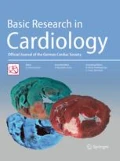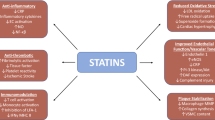Abstract
HMG CoA reductase inhibitiors (statins) have been shown to be effective lipid lowering agents and are able to significantly reduce cardiovascular mortality and morbidity in patients at risk for cardiovascular disease. Recent clinical and experimental data suggest that the benefit of statins may extend beyond their hepatic effects on serum cholesterol levels. This review summarizes the current evidence and the molecular mechanisms of the direct effects of statins on plaque stability, inflammation, endothelial function, oxidative stress, thrombosis and stroke. Furthermore, recent data on the effects of statins on bone marrow, bone density and dementia are described. In summary, statins have emerged as a novel and powerful tool to study cardiovascular biology, including protein isoprenylation, small G protein function, leukocyte activity and endothelial progenitor cells. These pleiotropic properties of statins may have important clinical implications in addition to lowering serum cholesterol.
Similar content being viewed by others
Author information
Authors and Affiliations
Additional information
Received: 10 October 2001, Accepted: 24 October 2001
Rights and permissions
About this article
Cite this article
Werner, N., Nickenig, G. & Laufs, U. Pleiotropic effects of HMG-CoA reductase inhibitors. Basic Res Cardiol 97, 105–116 (2002). https://doi.org/10.1007/s003950200000
Published:
Issue Date:
DOI: https://doi.org/10.1007/s003950200000




